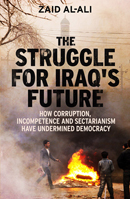 El Cairo.- Zaid al Ali presented us with his view on the current political situation of Iraq and a broad overview of the changes that have taken place in the country in the past decade since the 2003 war. He highlighted the negative impact derived from the 2005 Constitutional Process, which, despite an approval rating of 80%, he deems was drafted in an undemocratic and opaque way and, far from being a solid base for rule of Law, he thinks it is unviable and leaves the country exposed to the risk of different interpretations by the ruling politicians.
El Cairo.- Zaid al Ali presented us with his view on the current political situation of Iraq and a broad overview of the changes that have taken place in the country in the past decade since the 2003 war. He highlighted the negative impact derived from the 2005 Constitutional Process, which, despite an approval rating of 80%, he deems was drafted in an undemocratic and opaque way and, far from being a solid base for rule of Law, he thinks it is unviable and leaves the country exposed to the risk of different interpretations by the ruling politicians.
These issues and more are reflected in Zaid Al Ali’s recently published book, “The struggle for Iraq’s future”. Zaid is a lawyer specialized in comparative constitutional law and international commercia larbitration and former legal adviser to the United Nations in Iraq. He believes that Iraqi people have a strong sense of nationalism and unity that goes beyond the ethno sectarian strife image that other analysts present of the country. However, he points out there are many past mistakes and upcoming challenges that need to be overcome.
Zaid gave us some details on how the Constitutional Process took place, starting in January 2005 with the election of the Transitional National Assembly and the subsequent creation of a Constitutional Committee formed of 60 members. The Committee was dissolved six months after its creation. The preliminary Constitutional text provided by them was redrafted and modified in a few weeks by another closed committee. This occurred under the auspices of the US Embassy, who changed several articles, including the provision of federalism and included some other articles from the 2004 interim constitution.
To put us into context, Zaid explained that the Constitution was drafted in a moment when the war had just finished in the country and the Kurdish was the only region that enjoyed some type of institutional solidness, peace and stability. The closed committee proposed a federalist system that replicated the delegation of competences in the unique Kurdish area to the rest of the provinces, which were at a totally different stage on the institution building process. Under this proposal, competences like airspace, taxation, agriculture, education, foreign relations and agriculture (including standards for exports) could be delegated to the 18 provinces of Iraq. Considering the limited coordination capacity of the country this could derive into a chaotic structure and destabilize the institutional building process. Currently, the central government is not following the constitution and most decisions regarding provinces are occurring at the central levels.
Nour al Maliki, the current prime minister, was an exiled militant in Iran and Damascus during the times of Sadam. Technically, Maliki and his team are very weak and are facing tremendous challenges at all levels -economic, environmental, etc. Corruption is also ingrained in the power levels and political tensions are increasing.
Asked about alternatives to the present political program, he said that at the moment there are not many, but that he thinks a global vision proposal is expected to be presented for 2018, to which himself and other experts are willing to contribute. He thinks a modification of the constitution will be needed. He presented a view of the main political parties and alliances that are present in the upcoming 2014 elections and its relation to the alliances in the past elections. The status of the Iraqis affected by the Syrian conflict was also discussed.

Deja un comentario